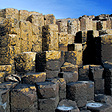ST PATRICK’S TRAIL
Northern Ireland Path of the Irish Patron Saint
 Saint Patrick is famously given credit for driving the snakes out of Ireland. More legend than fact, for while the Romans, the Normans and the Vikings all managed to get to the Irish island, snakes never actually got there. While now, the religious symbol of Ireland, Saint Patrick wasn’t Irish, he was actually born in northern Roman-ruled Britain about 387 (see Walking Hadrian’s Wall). He was the privileged son of a wealthy tax collector and grew up in a comfortable Roman household. The name Patrick is the Anglicized version of the Roman name he later referred to himself, Patricius. When he was 15, his privileged life changed forever when he was captured by a clan of Celtic outlaws and taken to Ireland as a slave, sent to work as a shepherd on the slopes of Slemish Mountain in present day County Antrim. It was during these hard lonesome days, he prayed and found a deep faith. These were the early days of Christianity, but the faith had already found its way among the Roman societies of Britain.
Saint Patrick is famously given credit for driving the snakes out of Ireland. More legend than fact, for while the Romans, the Normans and the Vikings all managed to get to the Irish island, snakes never actually got there. While now, the religious symbol of Ireland, Saint Patrick wasn’t Irish, he was actually born in northern Roman-ruled Britain about 387 (see Walking Hadrian’s Wall). He was the privileged son of a wealthy tax collector and grew up in a comfortable Roman household. The name Patrick is the Anglicized version of the Roman name he later referred to himself, Patricius. When he was 15, his privileged life changed forever when he was captured by a clan of Celtic outlaws and taken to Ireland as a slave, sent to work as a shepherd on the slopes of Slemish Mountain in present day County Antrim. It was during these hard lonesome days, he prayed and found a deep faith. These were the early days of Christianity, but the faith had already found its way among the Roman societies of Britain.
 After six years, Patrick managed to escape and return home to Britain, but he had chosen his path and called by God, went to France to study for the priesthood, rising to the status of Bishop. He made it his mission to return to Ireland and convert the druidic pagans to the new faith. He sailed up Strangford Lough to the south of modern Belfast and landed at the River Slaney. His fist convert was a fellow name Dichu, who gave him a barn to build his first church in Saul, County Down. Patrick traveled throughout the Irish island from Armagh to Tipperary (see Rock of Cashel), Mayo, Meath and Dublin, baptizing and converting the Royal Clan Chieftains. Patrick challenged the High King in Tara, Laoghaire, and the king’s son, Conall, converted, offering Patrick protection on his mission (see Hill of Tara).
After six years, Patrick managed to escape and return home to Britain, but he had chosen his path and called by God, went to France to study for the priesthood, rising to the status of Bishop. He made it his mission to return to Ireland and convert the druidic pagans to the new faith. He sailed up Strangford Lough to the south of modern Belfast and landed at the River Slaney. His fist convert was a fellow name Dichu, who gave him a barn to build his first church in Saul, County Down. Patrick traveled throughout the Irish island from Armagh to Tipperary (see Rock of Cashel), Mayo, Meath and Dublin, baptizing and converting the Royal Clan Chieftains. Patrick challenged the High King in Tara, Laoghaire, and the king’s son, Conall, converted, offering Patrick protection on his mission (see Hill of Tara).
 After his travels across Ireland, Patrick returned to the north and in 445, established Armagh as his center in Ireland, building a monastery church and later an archbishop's house (see Armagh Vicar's Hill). He died in 493 and his bones are believed to be buried on the grounds of the Down Cathedral, underneath and great stone marker added to the grave in 1900. The stone was actually laid there to keep the faithful, or just souvenir hunters from digging, though no real relics have actually been identified from the spot. The Irish saint is said to have died on March 17th, with the day now celebrated ever year as St Patrick’s Day, though what the ascetic cleric would think of all the drinking and partying in his name, one can only speculate.
After his travels across Ireland, Patrick returned to the north and in 445, established Armagh as his center in Ireland, building a monastery church and later an archbishop's house (see Armagh Vicar's Hill). He died in 493 and his bones are believed to be buried on the grounds of the Down Cathedral, underneath and great stone marker added to the grave in 1900. The stone was actually laid there to keep the faithful, or just souvenir hunters from digging, though no real relics have actually been identified from the spot. The Irish saint is said to have died on March 17th, with the day now celebrated ever year as St Patrick’s Day, though what the ascetic cleric would think of all the drinking and partying in his name, one can only speculate.
 The Saint Patrick’s Trail in Northern Ireland leads in a semi circle from Bangor, just south of Belfast to DownPatrick, Newry and Armagh, with a number of sites associated with St Patrick. In Down Patrick at the foot of the hill below the grave site at Down Cathedral, the Saint Patrick Centre is an audio visual exhibition and museum on the story of Ireland’s Patron Saint, making for a good over view of the legacy of Irish missionaries on the Dark Ages of Europe (see St Gallus in Switzerland). A map of the trail route is available with 2 for 1 discount coupons for the various sites along the trail, though many of the sights, especially the abbeys and churches are free to visit. © Bargain
Travel Europe
The Saint Patrick’s Trail in Northern Ireland leads in a semi circle from Bangor, just south of Belfast to DownPatrick, Newry and Armagh, with a number of sites associated with St Patrick. In Down Patrick at the foot of the hill below the grave site at Down Cathedral, the Saint Patrick Centre is an audio visual exhibition and museum on the story of Ireland’s Patron Saint, making for a good over view of the legacy of Irish missionaries on the Dark Ages of Europe (see St Gallus in Switzerland). A map of the trail route is available with 2 for 1 discount coupons for the various sites along the trail, though many of the sights, especially the abbeys and churches are free to visit. © Bargain
Travel Europe
Find best travel deals in Northern Ireland on TripAdvisor
Web
Info
St Patrick Centre
These articles are copyrighted and the sole property of Bargain Travel Europe and WLPV, LLC. and may not be copied or reprinted without permission.
SEE ALSO:
DRIVING
SCENIC IRELAND
ST. COLUMB'S CATHEDRAL - LONDONDERRY
DUNLUCE
CASTLE - ANTRIM COAST
CARRICK-A-REDE & FISHERMAN’S COTTAGE

